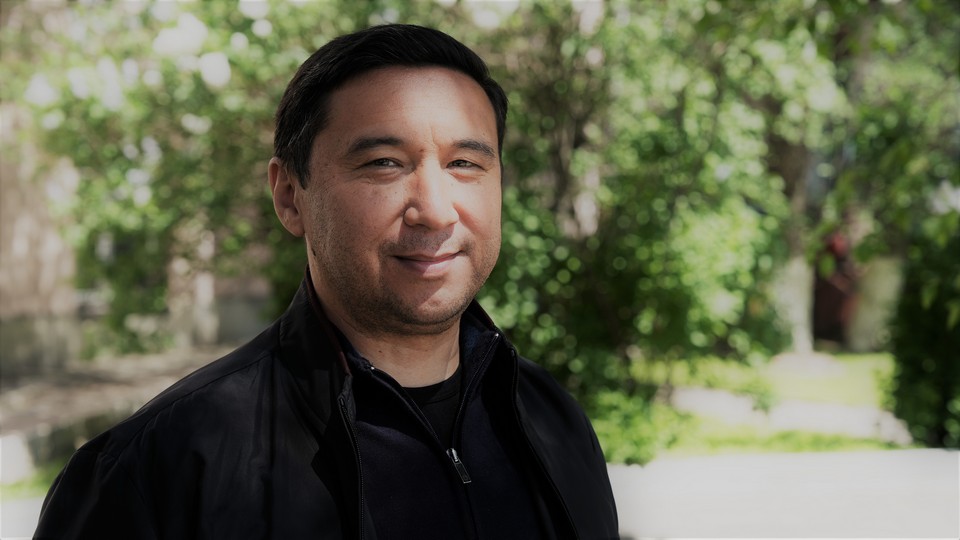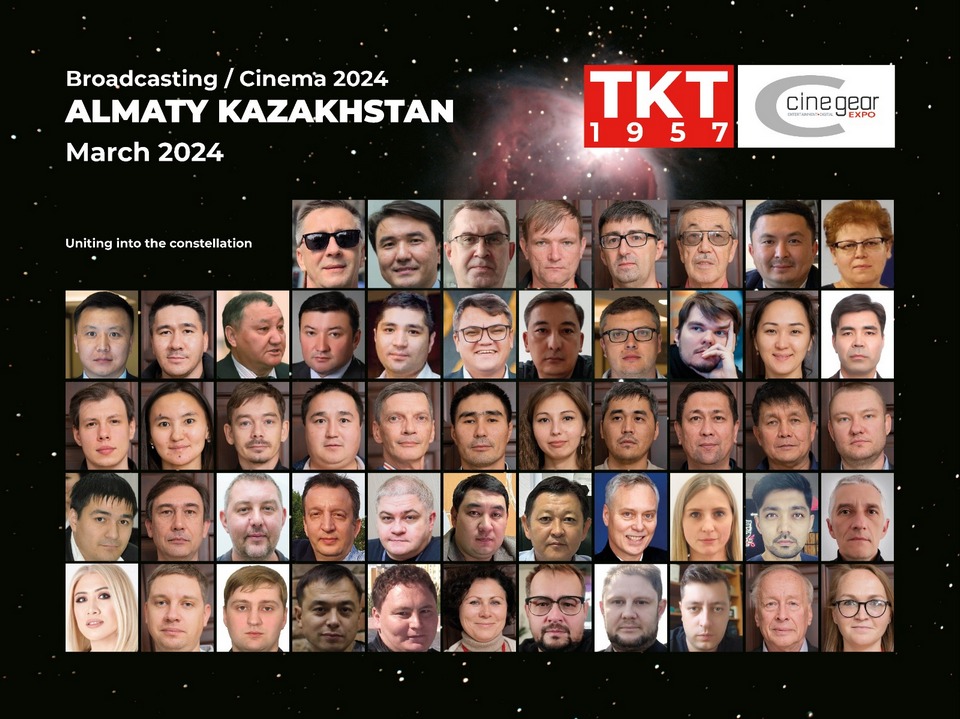Interview with Kairat Toksanbayev, Head of the Broadcasting Non-Studio Means Department at RTRK “Kazakhstan”, Almaty.
— Let’s start with your family. Kairat, when and where were you born? Who are your parents? What did they do before?
I was born on December 19, 1973, in the East of Kazakhstan, in the small town of Zyryanovsk, now it is called Altai. My parents were ordinary workers. My father was a miner, he had extensive experience in underground work, he was involved in the extraction of polymetallic ores. My mother was a seamstress, she worked in a fashion atelier. Besides me, there was also a younger sister in the family.
— What were your interests in school? What were you inclined to? What subjects did you like?
In school, as usual, there was a focus on physics and mathematics, I liked history, we had a very strong teacher in algebra and geometry, she made us study well. I attended technical clubs: aviation modeling, ship modeling. My father was close to technology, he soldered color music, repaired tape recorders, radios, and in childhood, I was always nearby. One remarkable moment. At that time there were still vacuum tube televisions with constant problems, sometimes with sound, sometimes with deflection, sometimes with something else. I turned on the TV once, but there was no sound, the sound tube had come off, all the contacts were loose. I took some wires, soldered them to the legs of the tube, and soldered the legs to the points where the contacts should be, and the sound appeared. Then I soldered several more tubes, and they stood on the boards behind the TV like octopuses.
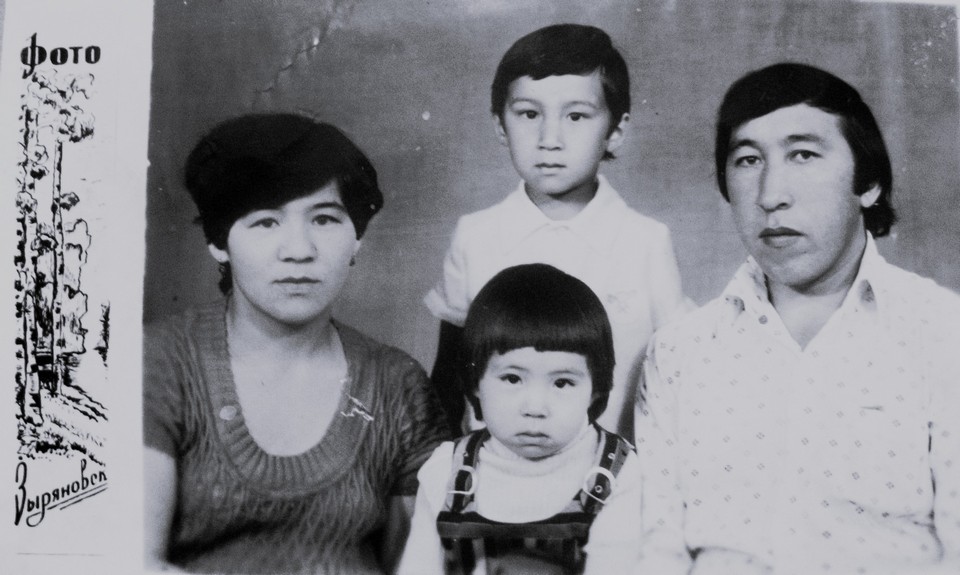
— Did you engage in sports?
Yes, of course. Mostly volleyball, I even have a youth rank. I wasn’t interested in power sports. Now I continue to play with pleasure. I love cycling.
— Did you finish school well? Where did you go after graduation?
I completed 8 grades of secondary school in 1989. I really wanted to study at a medical school, I was already preparing, but for some reason, in that year they removed the “Paramedic” faculty. I was disappointed and didn’t want to return to school, so I enrolled in a technical college, where I received education as a power grid and electrical equipment electrician. I graduated in 1992.
— What happened after you finished college? How did your life develop? How did you start working?
I worked as an electrician, and then got a job in television as a broadcast engineer at the local channel “Spectrum”. In the broadcast room, there was a simple Panasonic video mixer, a couple of VHS video players. The broadcast started in the evening, usually the program consisted of congratulations, two movies, and advertising between them, and that’s how the broadcast ended. Then in the studio, I did simple video editing, from one videotape recorder to another, here I got the basics of linear editing. That’s how my career in television began.
— What was the next stage?
Then I moved to Almaty. Life got busier here. I was working, getting higher education, and got married.
— In what year was that?
In 1996.
— Why did you decide to move to Almaty?
The thing is, Altai itself is a small town, and the main types of work there are either in the mines or at the flagship enterprises, and I didn’t have much desire to work there. I knew I would connect my life with television, there was an opportunity to get a job at the Qazaqstan TV channel, at that time it was “Kazakhstan 1”, and without thinking twice, I packed my bag and left.
— You came to Almaty, where did you live?
The first year I lived with my uncle, he was the one who invited me to this city. My uncle worked in the security forces, so he was far from television.
— What was your first job?
Video recording operator in the VTR department. I was a linear editing technician, at that time we worked on professional VHS video recorders, those small “bricks”, then I switched to more professional Panasonic recorders. Later, I moved to a three-station BetacamSP room, where we edited shows of different genres and formats. Among video engineers, there was such, so to speak, informal competition, I come up with some special effect or transition (Wipe), the engineer from another shift repeats it but complicates it slightly, then I will do the same effect and add something new, then he, and so on and so forth…
— Did you find the job by chance or did someone help you?
It wasn’t by chance. Sometime in my childhood, I saw the equipment set up for shooting in the Palace of Culture of the OB Van “Magnolia”. It made a very strong impression on me. It seemed to me that I saw a spacecraft. What I saw in my childhood stuck in my memory, and I decided to connect my life with television. In 1997, I enrolled in the Almaty Institute of Energy and Communications, specializing in “Radio Communications, Broadcasting, Television.” I studied in correspondence.
— How did you manage to combine studying and work?
We had exams once a year, and during that time, I took vacation leave. We studied seriously, passed all the exams ourselves, and the teachers were strict.
— How did your professional career develop further?
By that time, I had been working in editing for about seven to eight years and gradually began to master other specialties: I helped ASC engineers, went on OB Van field trips. At the beginning of the 2000s, the transition to non-linear editing began, and I became the head of the video editing department, then the shift supervisor at ASC TV. This was in 2002. And then from there, in 2003, I moved to the OB Van.
— Why did you decide to switch?
Editors probably know that if you spend 7–8 years in linear editing suites and fully master it, then good editors either become directors or move on to something else. I chose the PTS.
— What was the OB Van like?
At that time, the old Soviet trucks had exhausted their physical and moral resources and were no longer suitable. When I came, we received the first OB Van in the form of a flight case, a digital five-camera station. We used it for all outdoor recordings, then installed it in the OB Van “Korpunkt” chassis, and worked on it for several years until we received a proper station.
— What do you mean by “proper”?
Its design began in 2005–2006. In 2007, we received it, it was, I won’t lie, one of the first HD OB Van in the CIS. At that time, there were only two stations in Moscow, at the company “Eurasia” and in Ostankino. In 2008, a similar one was built for the Astana branch. Then the boom began: they started building them in England, at the SONY company, such TV companies as VGTRK, CenturyXXL, Mariinsky Theater, and others. But we were the first, and these stations are still in operation.
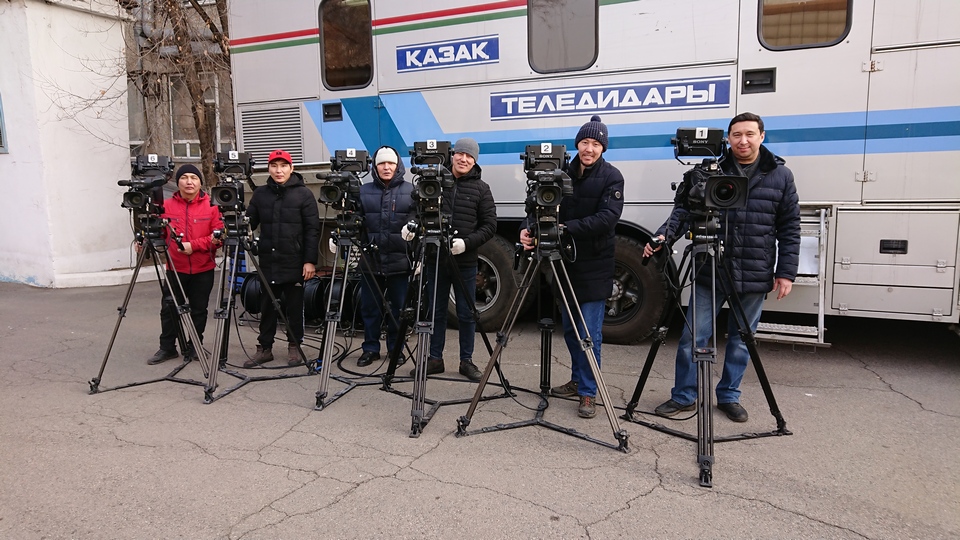
— Did you receive training in Basingstoke or in Kazakhstan?
After the PTS assembly was completed, we spent about two weeks training in Basingstoke. There was a director and several engineers who gave us basic knowledge of truck management, video and audio mixer settings, and shading. Then, upon arrival of the PTS in Almaty, specialists from the UK and Russia came to conduct on-site training.
— How difficult was it to transition to HD for the entire company?
Since we were the first, and there were few specialists in working with HD, it was really difficult for us, but we mastered the new equipment. Even specialists from the Moscow office of Sony were trained with us. At that time, all internal processes in ASC, from shooting to editing, began to be converted to digital format. The camera park had 4 HDCAM format cameras. Non-linear video editing systems already worked with HD signals. In general, post-production, together with OB Van, also started working in HD. The hardware ASC, however, still worked in SD. For some time, all shots were initially recorded in 4:3, then gradually transitioned to 16:9, and from 2009–10, the OB Van began to fully record in HD format to have an archive.
— When were you appointed the head of the OB Van?
It was in 2003–2004. I moved from the position of shift supervisor to the OB Van.
— What were the most interesting projects you worked on? What was challenging?
There were many diverse projects; we constantly participated in various events. One of the most memorable was the Winter Asian Games in 2011. Of course, we were not the main broadcasters, but all our stations worked for unilateral broadcasting. Specifically for this event, OB Van from Astana and all regional stations arrived in Almaty. We worked on sports broadcasting. We participated in a similar way in the Winter World University Games in 2017.
In the summer of 2017, during the World EXPO-2017 “Energy of the Future” in Astana, we worked for three months, covering the opening, closing, and the event itself. Our station was the main one at the opening, and about five OB Van worked with us. All signals converged to us, and our OB Van formed the main picture, the same thing happened at the closing.
We also participate in teleconferences with the head of state, shoot projects for the needs of the TV channel.
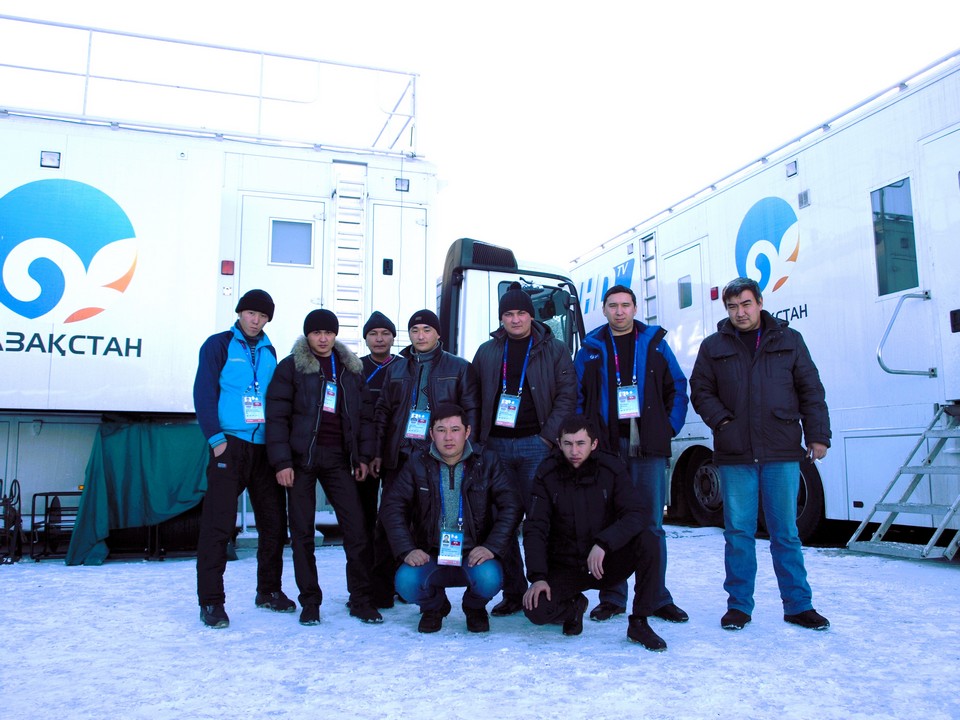
— So you lead a nomadic life?
Yes, we’ve traveled all over Kazakhstan.
— How often do you go on trips?
The OB Van is constantly on the move, almost every day there are shoots, and business trips happen at least once or twice a month. We’ve gotten used to this schedule, and we’ve worked on projects in many large and small cities in Kazakhstan.
— Are you currently the head of one OB Van or several?
In our branch, we have two HD OB Van and two satellite stations. In Astana, there’s exactly the same set of stations, but they have their own engineers.
— How did you manage work after the events in January?
During the January events, my department was not affected, all the stations remained operational. We also have a large studio equipped with equipment where OB Van were involved in producing programs and broadcasts, and for some time, the main workload was on us. We covered all recordings, studio and outdoor, using the station. Now everything is back to normal, and we’re working in our usual mode.
— What do you consider the main achievement in your professional career?
Working for the good of Kazakh television is the most important achievement and pride in life. Of course, there is still something to strive for. I haven’t reached the heights I would like to yet, but I can be proud that I participated in the first-ever broadcast of a football match in HD format in the history of Kazakh television. It was the first time in the history of Kazakh television that we, using an HD OB Van and a mobile satellite station, raised a high-definition signal on board a satellite, and Kazmedia Center received it and sent it to our broadcast studio and then on air.
— How has life outside of work been?
As usual, home, family. I met my wife at work. She worked as a video engineer. We got married in 2001. We have a son who is 21 years old and a daughter who is 14.
— What do your children do?
My son is a third-year university student, studying “Modern Technologies and IT.” My daughter is a versatile person; she attends a music school for guitar class and previously graduated from a choreography school.
— Do you have any hobbies?
My father, when he traveled on business trips, always brought back model airplane kits. It was during the Soviet era, and there was a shortage, but he always managed to find some models. I had a large collection of airplanes, and it remained in my homeland. And now, after 30 years, I wanted to return to this hobby. Currently, I’m assembling models related to World War II: Soviet, Luftwaffe, and Allied aircraft. Now it’s not about quantity but about quality.


